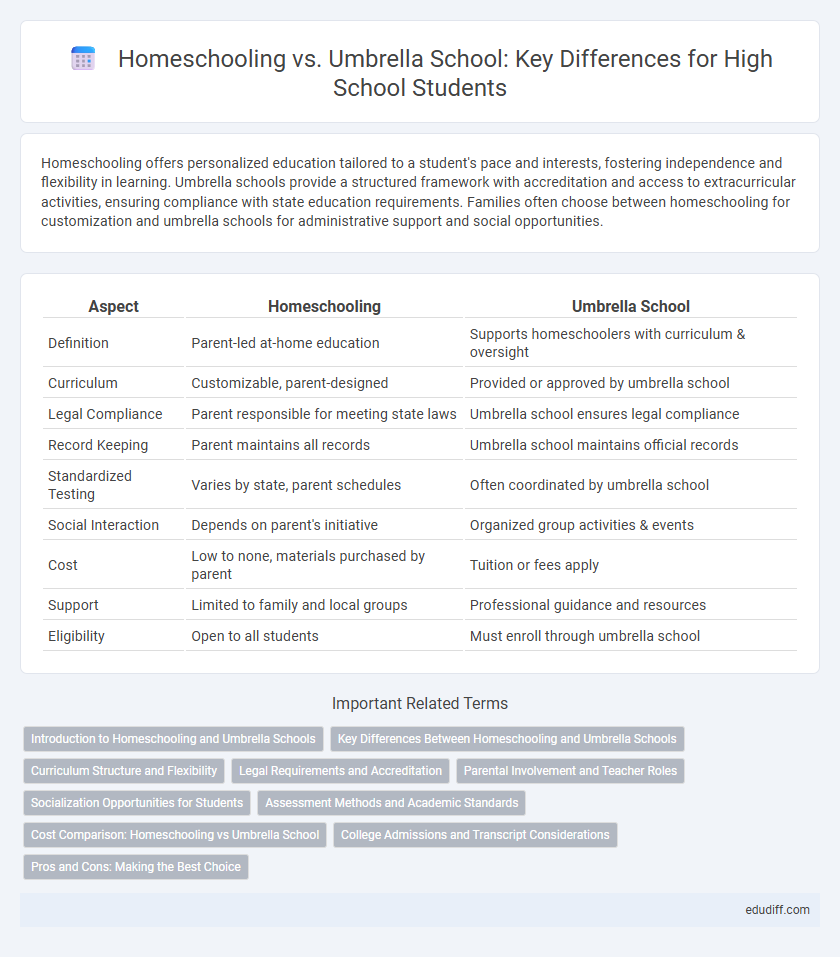Homeschooling offers personalized education tailored to a student's pace and interests, fostering independence and flexibility in learning. Umbrella schools provide a structured framework with accreditation and access to extracurricular activities, ensuring compliance with state education requirements. Families often choose between homeschooling for customization and umbrella schools for administrative support and social opportunities.
Table of Comparison
| Aspect | Homeschooling | Umbrella School |
|---|---|---|
| Definition | Parent-led at-home education | Supports homeschoolers with curriculum & oversight |
| Curriculum | Customizable, parent-designed | Provided or approved by umbrella school |
| Legal Compliance | Parent responsible for meeting state laws | Umbrella school ensures legal compliance |
| Record Keeping | Parent maintains all records | Umbrella school maintains official records |
| Standardized Testing | Varies by state, parent schedules | Often coordinated by umbrella school |
| Social Interaction | Depends on parent's initiative | Organized group activities & events |
| Cost | Low to none, materials purchased by parent | Tuition or fees apply |
| Support | Limited to family and local groups | Professional guidance and resources |
| Eligibility | Open to all students | Must enroll through umbrella school |
Introduction to Homeschooling and Umbrella Schools
Homeschooling involves parents taking full responsibility for their child's education by designing curriculum and teaching at home, offering personalized learning tailored to the student's pace and interests. Umbrella schools provide structured oversight and support for homeschooling families, ensuring legal compliance and access to group activities, resources, and standardized assessments. Both options allow flexibility but differ in levels of supervision, socialization opportunities, and administrative requirements, affecting families' choices in secondary education.
Key Differences Between Homeschooling and Umbrella Schools
Homeschooling involves parents or guardians directly educating their children at home, offering complete control over curriculum and pace, while umbrella schools provide a structured framework and administrative support for homeschoolers, including access to resources and validation of coursework. Umbrella schools often handle record-keeping, standardized testing, and compliance with state education regulations, which homeschooling families must manage independently. The primary distinction lies in the level of oversight and support: homeschooling is a fully parent-led education model, whereas umbrella schools act as intermediaries between families and public education authorities.
Curriculum Structure and Flexibility
Homeschooling offers personalized curriculum flexibility, allowing parents to tailor lessons to their child's pace and interests, unlike umbrella schools that provide a structured curriculum aligned with state standards. Umbrella schools facilitate standardized assessments and documentation, ideal for families seeking a balance of oversight and freedom. Both options accommodate diverse learning styles but differ significantly in curriculum control and regulatory compliance.
Legal Requirements and Accreditation
Homeschooling requires parents to comply with state-specific legal requirements, often involving curriculum approval, attendance records, and standardized testing, without mandatory formal accreditation. Umbrella schools operate under a recognized educational institution's umbrella, providing legal compliance support, structured curriculum, and official accreditation, which benefits students seeking standardized transcripts and credit recognition. Understanding state laws ensures families choose the option aligning best with their educational goals and legal obligations.
Parental Involvement and Teacher Roles
Parental involvement in homeschooling is extensive, as parents act as primary educators, tailoring lessons and managing daily instruction to meet their child's needs. In contrast, umbrella schools provide a structured curriculum and certified teachers oversee educational standards, reducing the direct teaching responsibility for parents. Teacher roles in umbrella schools include curriculum guidance and performance assessment, whereas homeschooling parents often assume multiple roles, from instructor to evaluator.
Socialization Opportunities for Students
Homeschooling offers personalized socialization opportunities through family and local community activities, allowing students to engage in diverse, interest-based groups. Umbrella schools provide structured socialization by organizing group classes, field trips, and extracurricular activities that mimic traditional school environments. Both options foster social development but differ in their approach and scope of peer interaction.
Assessment Methods and Academic Standards
Homeschooling allows parents to tailor assessment methods such as portfolios, projects, and individualized tests, often lacking standardized evaluations, while umbrella schools implement formal academic standards with regular standardized testing and curriculum oversight. Umbrella schools provide structured assessment aligned with state educational requirements, ensuring consistent academic benchmarks. These contrasting approaches impact the rigor and recognition of student performance in high school education.
Cost Comparison: Homeschooling vs Umbrella School
Homeschooling typically incurs lower overall costs, including expenses for curriculum materials, supplies, and standardized testing fees, while umbrella schools often charge tuition and administrative fees that can significantly increase monthly expenses. Families choosing homeschooling may save money by customizing educational resources and avoiding institutional costs, but must budget for extras like field trips and tutoring. Umbrella schools provide structured oversight and access to accredited programs, which may justify their higher fees compared to the more flexible, cost-efficient homeschooling approach.
College Admissions and Transcript Considerations
Homeschooling and umbrella schools differ significantly in college admissions and transcript clarity; homeschooling often requires parents to create and validate transcripts, potentially raising questions about course rigor and credit standards. Umbrella schools provide more structured transcripts recognized by colleges, facilitating smoother application processes through standardized grading and accreditation. Understanding each option's impact on transcript acceptance and verified coursework emphasizes the importance of transparent academic records for competitive college admissions.
Pros and Cons: Making the Best Choice
Homeschooling offers personalized learning plans tailored to a student's individual needs and flexible scheduling but requires strong parental involvement and self-discipline. Umbrella schools provide structured curricula, access to accredited programs, and group activities, easing the administrative burden on parents while potentially limiting customization. Evaluating factors like academic goals, socialization opportunities, and regulatory requirements helps families make the best choice between these educational options.
Homeschooling vs Umbrella School Infographic

 edudiff.com
edudiff.com